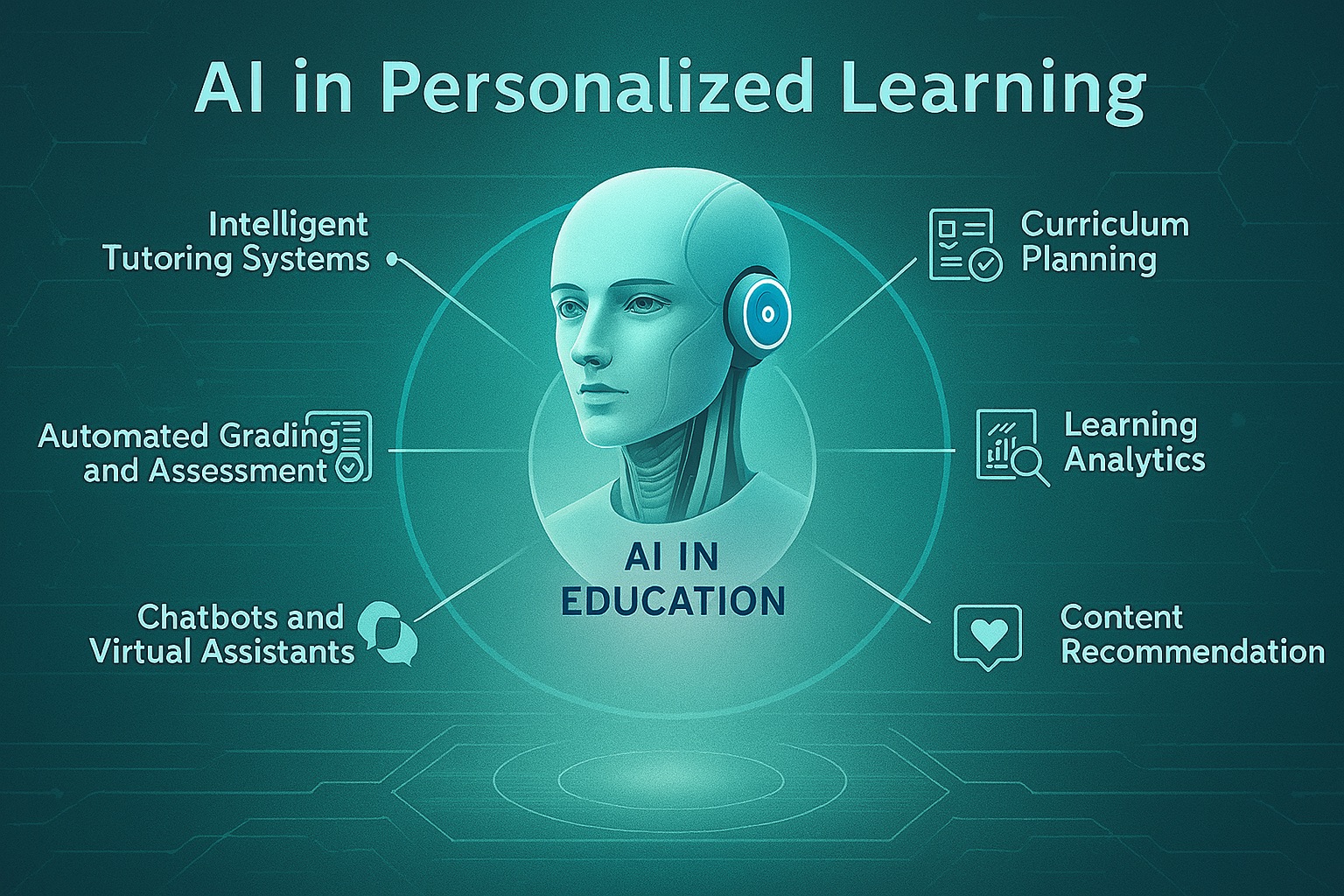A comprehensive, self-directed learning experience designed for the AI-driven future
Introduction: Why Traditional AI Education Falls Short
The landscape of artificial intelligence education is broken. Despite the explosive growth of AI tools and their integration into every aspect of our professional and personal lives, most educational resources remain frustratingly outdated, superficial, or disconnected from real-world application. Students are left with fragmented knowledge, theoretical concepts that don’t translate to practical skills, and a fundamental lack of strategic thinking about AI’s transformative impact on society and business.
This gap in quality AI education has never been more critical to address. As we stand at the threshold of what Thorsten Meyer calls “The AI Bifurcation” – the growing divergence between human and artificial intelligence capabilities – the need for comprehensive, practical, and strategically-minded AI education has become urgent.
That’s why we’ve developed the AI Fundamentals Course: a complete, end-to-end, self-directed learning experience that doesn’t just teach you about AI, but transforms you into a thoughtful, skilled, and responsible AI practitioner with strategic vision for the future.
The Philosophy Behind Our Approach
Learning by Doing, Not Just Consuming
Traditional AI courses suffer from what we call “consumption syndrome” – endless videos, articles, and theoretical explanations that leave learners feeling informed but not empowered. Our approach is fundamentally different. Every concept in the AI Fundamentals Course is reinforced with practical activities, real-world applications, and hands-on exercises that build genuine competency.
When you learn about AI hallucinations, you don’t just read about them – you complete a comprehensive Hallucination Detection Challenge that teaches you to identify and verify AI-generated content. When you study prompt engineering, you don’t just memorize techniques – you build a personal prompt library and create AI interaction prototypes that you can use immediately in your work.
Strategic Thinking for the AI-Driven Future
Inspired by the work of Thorsten Meyer, Riley Brown, and Greg Isenberg, this course goes beyond technical skills to develop strategic thinking about AI’s business and societal impact. We don’t just teach you how to use AI tools – we prepare you for the post-labor economy, help you understand the AI bifurcation concept, and guide you in developing AI strategies for organizations.
This strategic focus sets our course apart from purely technical training programs. You’ll emerge not just as an AI user, but as an AI strategist capable of navigating the complex challenges and opportunities of our AI-driven future.
Community-Driven Learning
Learning AI in isolation is both ineffective and unnecessary. Our course is built around community engagement, peer learning, and collaborative problem-solving. You’ll join a network of learners, share insights, get feedback on your projects, and contribute to a growing knowledge base of AI best practices.
Course Overview: 7 Modules, 19 Topics, 14 Weeks
The AI Fundamentals Course is structured as a comprehensive 14-week journey that takes you from AI novice to strategic AI practitioner. The course is organized into seven distinct modules, each building upon the previous while introducing new layers of complexity and strategic thinking.
Module 1: AI Foundations & Safety (Weeks 1-2)
Building Trust Through Understanding
Your AI journey begins with the most critical foundation: understanding how to use AI safely and responsibly. This module addresses the privacy concerns, ethical considerations, and fundamental limitations that every AI practitioner must understand.
Key Topics:
- Understanding AI Data Privacy
- Model Hallucinations Explained
- How AI Processes Your Questions
Hands-On Activities:
- AI Privacy Audit (45 minutes): Analyze and improve privacy settings across your AI tools
- Hallucination Detection Challenge (60 minutes): Learn to identify and verify AI-generated content
- AI Processing Experiment (30 minutes): Understand how different AI models interpret and respond to identical prompts
By the end of this module, you’ll have established a personal AI safety framework and developed critical thinking skills for evaluating AI outputs.
Module 2: AI Models & Architecture (Weeks 3-4)
Understanding the Technology Behind the Magic
With safety foundations in place, we dive into the technical architecture that powers modern AI systems. This module demystifies foundation models, explores the benefits of open-source alternatives, and introduces advanced concepts like Mixture of Experts models.
Key Topics:
- Foundation Models Explained
- Open Source Models and Their Benefits
- Mixture of Experts Models
Hands-On Activities:
- Model Comparison Study (90 minutes): Test different AI models with identical prompts and analyze their strengths and weaknesses
- Open Source Setup Challenge (120 minutes): Install and configure open-source AI models for local use
- MoE Architecture Analysis (60 minutes): Create visual diagrams explaining how Mixture of Experts models work
This module transforms you from an AI user into someone who understands the underlying technology and can make informed decisions about which models to use for specific tasks.
Module 3: Implementation & Optimization (Weeks 5-6)
Making AI Work for You
Understanding AI models is one thing; implementing them effectively is another. This module focuses on practical implementation strategies, cost optimization techniques, and the technical challenges of running AI locally.
Key Topics:
- Challenges of Running AI Models Locally
- Cost-Saving with Specialized AI Models
- Understanding Context Length in AI Models
Hands-On Activities:
- Local AI Environment Setup (180 minutes): Build a complete local AI environment and document the process
- Cost Analysis Project (90 minutes): Analyze your personal AI usage costs and develop optimization strategies
- Context Length Experimentation (75 minutes): Test the limits and capabilities of different context lengths
By completing this module, you’ll have a functional local AI setup and a deep understanding of the economic and technical considerations involved in AI implementation.
Module 4: AI Interaction & Engineering (Weeks 7-8)
Mastering the Art of AI Communication
The quality of your AI interactions depends heavily on how you communicate with AI systems. This module covers both prompt engineering and the emerging field of context engineering, teaching you to design sophisticated AI interactions that consistently produce high-quality results.
Key Topics:
- Prompt Engineering Mastery
- Context Engineering
Hands-On Activities:
- Personal Prompt Library Development (120 minutes): Build a comprehensive library of tested, effective prompts for your specific use cases
- Context Engineering Workshop (150 minutes): Design context management systems for complex AI workflows
- AI Interaction Prototyping (90 minutes): Create and test sophisticated AI interaction patterns
This module elevates your AI communication skills from basic prompting to advanced interaction design, enabling you to extract maximum value from AI systems.
Module 5: AI Limitations & Responsible Use (Weeks 9-10)
Understanding Boundaries and Ethics
No AI education is complete without a thorough understanding of AI’s limitations and the ethical considerations surrounding its use. This module addresses internet browsing limitations, environmental impact, and the fascinating phenomenon of emergent behavior in AI models.
Key Topics:
- AI’s Limitations: Browsing the Internet
- AI’s Environmental Impact and Efficiency
- Emergent Behavior in AI Models
Hands-On Activities:
- Limitation Testing Protocol (90 minutes): Systematically test and document AI limitations across different domains
- Environmental Impact Assessment (60 minutes): Calculate and analyze the environmental footprint of your AI usage
- Emergent Behavior Investigation (60 minutes): Explore and document unexpected AI behaviors and capabilities
This module ensures you become a responsible AI practitioner who understands both the capabilities and constraints of current AI technology.
Module 6: Integration & Future Applications (Weeks 11-12)
Building Your AI-Enhanced Future
With technical skills and ethical understanding in place, this module focuses on practical integration of AI into your personal and professional workflows. You’ll develop a personalized AI toolkit and explore industry-specific applications.
Key Topics:
- Building Your Personal AI Toolkit
- AI in Your Industry/Field
Hands-On Activities:
- Personal AI Toolkit Development (180 minutes): Create a comprehensive, customized AI workflow system
- Industry Application Case Study (120 minutes): Analyze and document AI applications specific to your field
- AI-Enhanced Workflow Design (90 minutes): Redesign your key workflows to incorporate AI assistance
This module transforms theoretical knowledge into practical systems you can use immediately to enhance your productivity and capabilities.
Module 7: AI’s Business & Societal Impact (Weeks 13-14)
Strategic Thinking for the AI-Driven Future
The final module, heavily inspired by Thorsten Meyer’s strategic approach to AI, focuses on the broader implications of AI for business and society. This is where technical skills meet strategic thinking, preparing you for leadership in the AI-driven future.
Key Topics:
- Post-Labor Economics and the Future of Work
- AI Strategy for Business and Organizations
- The AI Bifurcation: Human vs. Machine Intelligence
Hands-On Activities:
- Post-Labor Career Planning Workshop (120 minutes): Develop a strategic career plan for the AI-driven economy
- AI Strategy Development Exercise (150 minutes): Create a comprehensive AI strategy for a real organization
- Human-AI Collaboration Design Challenge (90 minutes): Design optimal human-AI collaboration systems
This module ensures you graduate not just as an AI practitioner, but as an AI strategist capable of guiding organizations and individuals through the AI transformation.
The Revolutionary Learning Methodology
40+ Hands-On Activities: Learning Through Application
The heart of the AI Fundamentals Course lies in its extensive collection of practical activities. Unlike traditional courses that rely heavily on passive consumption of content, our approach ensures that every concept is immediately applied and reinforced through hands-on experience.
Activity Distribution:
- 35% Practical Exercises: Direct application of AI tools and techniques
- 25% Tool Building: Creating systems and workflows you can use immediately
- 20% Strategic Planning: Developing long-term AI strategies and career plans
- 15% Analysis Activities: Critical evaluation of AI outputs and capabilities
- 5% Community Projects: Collaborative learning and knowledge sharing
Each activity is carefully designed to build upon previous learning while introducing new challenges. For example, the AI Privacy Audit in Week 1 not only teaches privacy best practices but also establishes the critical thinking framework you’ll use throughout the course when evaluating AI tools and outputs.
Progressive Skill Development
The course follows a carefully structured progression that ensures solid foundations before advancing to complex concepts:
Weeks 1-6: Foundation Building
- Technical understanding of AI systems
- Safety and ethical frameworks
- Basic implementation skills
- Cost and efficiency optimization
Weeks 7-10: Advanced Application
- Sophisticated AI interaction techniques
- Understanding of limitations and boundaries
- Responsible use practices
- Critical evaluation skills
Weeks 11-14: Strategic Integration
- Personal and professional AI integration
- Industry-specific applications
- Business strategy development
- Future-oriented planning
This progression ensures that you’re never overwhelmed while consistently challenging you to grow and apply your knowledge in increasingly sophisticated ways.
Community-Driven Learning Environment
Learning AI in isolation is both ineffective and unnecessary. The AI Fundamentals Course is built around a vibrant community of learners who support, challenge, and inspire each other throughout the journey.
Community Engagement Platforms:
- Discord Servers: Real-time discussion and immediate help
- Reddit Communities: In-depth discussions and resource sharing
- LinkedIn Groups: Professional networking and career development
- Twitter/X: Following AI thought leaders and staying current
- YouTube Channels: Video tutorials and expert insights
Community Activities:
- Monthly Challenges: Collaborative problem-solving exercises
- Study Buddy System: Paired learning for accountability and support
- Demo Days: Showcasing projects and learning from peers
- Expert Q&A Sessions: Direct access to AI practitioners and thought leaders
The community aspect transforms individual learning into collaborative growth, ensuring you’re never stuck and always inspired by the achievements and insights of your peers.
Inspiration from Leading AI Educators
Riley Brown: Practical, Step-by-Step Learning
Riley Brown’s approach to AI education emphasizes practical, actionable steps that learners can implement immediately. His methodology of breaking complex concepts into manageable, sequential actions is woven throughout our course structure. Every module includes clear, step-by-step activities that build confidence and competence progressively.
From Riley’s approach, we’ve incorporated:
- Immediate Applicability: Every lesson includes something you can use right away
- Clear Progression: Each step builds logically on the previous one
- Real-World Focus: All activities are based on actual use cases and challenges
- Confidence Building: Success in early activities builds momentum for more complex challenges
Greg Isenberg: Business-Focused Application
Greg Isenberg’s emphasis on the business applications of AI and entrepreneurial thinking influences our strategic modules. His approach to identifying opportunities and building systems is reflected in our focus on creating personal AI toolkits and developing business strategies.
From Greg’s methodology, we’ve integrated:
- Opportunity Recognition: Training to identify AI applications in various industries
- System Building: Creating sustainable, scalable AI workflows
- Strategic Thinking: Understanding AI’s impact on business models and markets
- Entrepreneurial Mindset: Approaching AI as a tool for creating value and solving problems
Thorsten Meyer: Strategic Vision and Future Preparation
Thorsten Meyer’s work on the AI Bifurcation and post-labor economics provides the strategic foundation for our advanced modules. His anti-doomer, optimistically realistic approach to AI’s future impact shapes our perspective on preparing for an AI-driven world.
From Thorsten’s framework, we’ve incorporated:
- The AI Bifurcation Concept: Understanding the divergence between human and AI capabilities
- Post-Labor Economics: Preparing for economic shifts as AI transforms work
- Strategic AI Implementation: Creating comprehensive organizational AI strategies
- Future-Oriented Thinking: Developing long-term perspectives on AI’s societal impact
Comprehensive Resource Library
Curated Learning Materials
The course includes access to a carefully curated library of resources that supplement the core curriculum:
Essential Reading:
- Thorsten Meyer & Aiko Tanaka: “The AI Bifurcation” – Understanding human-AI divergence
- Stanford HAI Research Papers – Academic perspectives on AI development
- Harvard Business Review AI Strategy Collection – Business applications and frameworks
- MIT Sloan AI Implementation Guides – Practical organizational strategies
Video Resources:
- AI Unfiltered with Thorsten Meyer – Weekly insights on AI developments
- Riley Brown’s Tutorial Series – Step-by-step AI implementation guides
- Greg Isenberg’s Business Applications – Entrepreneurial AI strategies
- Two Minute Papers – Latest AI research explained simply
Interactive Tools:
- Personal AI toolkit templates
- Prompt engineering frameworks
- Cost calculation spreadsheets
- Strategy development worksheets
Expert Network Access
Course participants gain access to a network of AI practitioners, researchers, and thought leaders who provide ongoing guidance and insights:
Regular Contributors:
- AI researchers from leading universities
- Industry practitioners from major tech companies
- Entrepreneurs building AI-powered businesses
- Policy experts working on AI governance
Engagement Opportunities:
- Monthly expert Q&A sessions
- Industry-specific discussion groups
- Career mentorship programs
- Project feedback and guidance
The 14-Week Journey: Your Path to AI Mastery
Week-by-Week Progression
Weeks 1-2: Foundation and Safety
Your journey begins with establishing a solid foundation in AI safety and ethics. You’ll complete your first major activity – the AI Privacy Audit – which not only protects your data but also develops the critical thinking skills you’ll use throughout the course.
Key Milestone: Complete AI Safety Framework
Weeks 3-4: Technical Understanding
Dive deep into how AI models actually work. You’ll compare different models, explore open-source alternatives, and understand the architecture behind modern AI systems.
Key Milestone: Functional understanding of AI model types and capabilities
Weeks 5-6: Implementation Mastery
Learn to implement AI solutions effectively, including setting up local environments and optimizing costs. This is where theory meets practice.
Key Milestone: Functional Local AI Environment
Weeks 7-8: Interaction Excellence
Master the art of communicating with AI systems through advanced prompt and context engineering. Build your personal prompt library and design sophisticated AI interactions.
Key Milestone: Personal Prompt Engineering System
Weeks 9-10: Responsible Practice
Understand AI’s limitations and develop frameworks for responsible use. Explore environmental impact and emergent behaviors.
Key Milestone: Comprehensive AI Limitation Documentation
Weeks 11-12: Integration and Application
Create your personal AI toolkit and explore industry-specific applications. This is where you build systems you’ll use long after the course ends.
Key Milestone: Complete AI Implementation Case Study
Weeks 13-14: Strategic Vision
Develop strategic thinking about AI’s future impact. Create career plans for the post-labor economy and design AI strategies for organizations.
Key Milestone: Strategic AI Adoption Roadmap
Skill Development Tracking
Throughout the 14-week journey, you’ll track your progress across three key dimensions:
Technical Skills (Weeks 1-8 Focus)
- Understanding of AI model architecture
- Ability to implement and optimize AI solutions
- Proficiency in prompt and context engineering
- Knowledge of AI limitations and capabilities
Strategic Thinking (Weeks 9-14 Focus)
- Understanding of AI’s business impact
- Ability to develop organizational AI strategies
- Knowledge of post-labor economics implications
- Skills in human-AI collaboration design
Practical Application (Throughout)
- Personal AI toolkit development
- Industry-specific implementation skills
- Community engagement and knowledge sharing
- Project management and documentation abilities
Getting Started: Your First Steps
Immediate Actions (Next 24 Hours)
1. Set Up Your Learning Environment
- Choose a note-taking system (Notion, Obsidian, or simple documents)
- Create accounts with major AI tools (ChatGPT, Claude, etc.)
- Organize browser bookmarks for quick resource access
- Download the complete course guide and activity templates
2. Join the Learning Community
- Find and join relevant Discord servers for AI learners
- Subscribe to key Reddit communities (r/MachineLearning, r/artificial)
- Connect with other learners on LinkedIn
- Follow course contributors on Twitter/X
3. Complete Your First Activity
Begin with the AI Privacy Audit (45 minutes):
- Document your current AI tool usage
- Review and improve privacy settings
- Implement basic security improvements
- Start your learning journal
4. Plan Your Learning Schedule
- Block out 3-5 hours per week for course activities
- Schedule specific times for community engagement
- Set up reminders for weekly milestones
- Create accountability systems with study partners
First Week Checklist
By the end of your first week, you should have completed:
- [ ] Learning environment setup (note-taking app, AI tool accounts)
- [ ] Community platform registration and introduction
- [ ] AI Privacy Audit completion
- [ ] Hallucination detection practice exercises
- [ ] Learning journal establishment
- [ ] Week 2 activity planning
Building Momentum
The key to success in the AI Fundamentals Course is consistent, incremental progress. Each week builds upon the previous, creating a compound learning effect that accelerates your development. The activities are designed to be challenging but achievable, ensuring you build confidence while continuously expanding your capabilities.
Remember: this isn’t just a course you complete – it’s a transformation you undergo. By the end of 14 weeks, you won’t just know about AI; you’ll think strategically about its implications, use it effectively in your work, and be prepared for the AI-driven future that’s rapidly approaching.
The Strategic Focus: Preparing for the AI Bifurcation
Understanding the AI Bifurcation
One of the most profound concepts shaping our approach to AI education comes from Thorsten Meyer’s work on “The AI Bifurcation” – the growing divergence between human and artificial intelligence capabilities. This concept fundamentally changes how we think about learning AI and preparing for the future.
The AI Bifurcation describes a future where AI systems become increasingly capable in specific domains while human intelligence maintains its unique strengths in creativity, complex decision-making, and emotional intelligence. Rather than viewing this as a competition between humans and machines, the bifurcation concept helps us understand how to design complementary relationships that leverage the best of both forms of intelligence.
Key Implications of the AI Bifurcation:
1. Specialization vs. Generalization
AI systems excel at specialized tasks with clear parameters and large datasets. Humans excel at generalizing across domains, making connections between disparate concepts, and navigating ambiguous situations. Understanding this distinction helps you identify where AI can enhance your work and where human judgment remains irreplaceable.
2. Speed vs. Wisdom
AI can process information and generate responses at superhuman speeds. Humans provide wisdom, context, and ethical judgment that comes from lived experience and cultural understanding. The most effective AI implementations combine AI’s processing speed with human wisdom and oversight.
3. Pattern Recognition vs. Pattern Breaking
AI excels at recognizing patterns in existing data and extrapolating from known examples. Humans excel at breaking patterns, thinking outside established frameworks, and creating genuinely novel solutions. This complementarity is essential for innovation and creative problem-solving.
Post-Labor Economics: Preparing for Economic Transformation
The AI Fundamentals Course doesn’t just teach you to use AI tools – it prepares you for the economic transformation that AI will bring. Thorsten Meyer’s work on post-labor economics provides the framework for understanding and preparing for these changes.
The Shift to a Meaning Economy
As AI automates routine cognitive tasks, human value increasingly lies in areas that require meaning-making, relationship-building, and creative problem-solving. The post-labor economy isn’t about unemployment – it’s about the evolution of work toward uniquely human capabilities.
Key Areas of Human Value in the AI Era:
1. Creative Synthesis
While AI can generate content based on patterns in training data, humans excel at creative synthesis – combining ideas from different domains in novel ways, understanding cultural context, and creating work that resonates emotionally with other humans.
2. Relationship and Trust Building
Business relationships, therapeutic connections, educational mentorship, and community leadership all require the kind of trust and emotional intelligence that remains uniquely human. These areas will become increasingly valuable as AI handles more routine interactions.
3. Ethical Decision-Making
Complex ethical decisions require understanding of human values, cultural context, and long-term consequences that go beyond pattern recognition. Humans will remain essential for making decisions that affect other humans’ lives and well-being.
4. Strategic Vision and Leadership
While AI can analyze data and suggest optimizations, strategic vision requires understanding of human motivations, market dynamics, and long-term trends that may not be apparent in historical data. Leadership in the AI era will focus on guiding human-AI collaboration and making decisions about AI implementation.
Developing Your Post-Labor Career Strategy
The course includes comprehensive activities to help you develop a career strategy for the AI-driven future:
Post-Labor Career Planning Workshop (120 minutes)
This intensive workshop guides you through a systematic analysis of your current role and future opportunities:
Phase 1: Current Role Analysis (30 minutes)
- Map your current job tasks against AI capabilities
- Identify which aspects of your work could be automated
- Recognize uniquely human elements that will become more valuable
- Assess your skills against future market needs
Phase 2: Future Scenario Planning (45 minutes)
- Develop three scenarios for AI impact in your industry (5-year, 10-year, 20-year)
- Identify new job categories that might emerge
- Recognize skills that will become more valuable
- Understand economic models that might develop
Phase 3: Strategic Roadmap Development (45 minutes)
- Create a skills acquisition plan focused on uniquely human capabilities
- Identify AI collaboration opportunities in your field
- Develop transition strategies for different scenarios
- Build a network of AI-savvy professionals
- Plan for continuous learning and adaptation
AI Strategy for Organizations
Beyond personal career planning, the course prepares you to guide organizations through AI transformation. This strategic capability is increasingly valuable as businesses struggle to implement AI effectively.
The AI Strategy Development Exercise (150 minutes)
This comprehensive exercise teaches you to create organizational AI strategies:
Phase 1: Organizational Assessment (45 minutes)
- Analyze current AI maturity level
- Identify business objectives and challenges
- Map competitive landscape and AI adoption
- Assess resource requirements and constraints
Phase 2: Strategic Framework Development (60 minutes)
- Define AI vision and objectives aligned with business goals
- Identify high-impact AI use cases
- Develop implementation timeline and milestones
- Plan for change management and training
- Create governance frameworks for responsible AI use
Phase 3: Risk Assessment and Implementation Planning (30 minutes)
- Identify potential risks and challenges
- Develop mitigation strategies
- Plan for ethical considerations and bias prevention
- Create monitoring and evaluation frameworks
Phase 4: Business Case Development (15 minutes)
- Create executive summary and presentation
- Include ROI projections and success metrics
- Prepare for stakeholder communication and buy-in
Human-AI Collaboration Design
The future belongs to those who can design effective human-AI collaboration systems. This skill combines technical understanding with strategic thinking and human psychology.
The Human-AI Collaboration Design Challenge (90 minutes)
This activity teaches you to design optimal collaboration systems:
Phase 1: Bifurcation Analysis (30 minutes)
- Map human vs. AI strengths and weaknesses in your chosen domain
- Identify areas of divergence and convergence
- Analyze complementary capabilities
- Understand decision-making frameworks
Phase 2: Collaboration System Design (45 minutes)
- Choose specific domain (healthcare, education, business, etc.)
- Design human-AI collaboration workflow
- Define roles and responsibilities for each
- Create handoff points and decision frameworks
- Plan for continuous learning and adaptation
Phase 3: Prototype Testing (15 minutes)
- Test collaboration design with real AI tools
- Identify optimization opportunities
- Refine based on practical experience
- Document lessons learned and best practices
Real-World Applications and Case Studies
Industry-Specific Implementation
The AI Fundamentals Course recognizes that AI application varies significantly across industries. Module 6 includes comprehensive exploration of AI applications in various fields:
Healthcare and Medicine
- AI-assisted diagnosis and treatment planning
- Drug discovery and development acceleration
- Patient monitoring and predictive analytics
- Electronic health record optimization
- Telemedicine and remote care enhancement
Education and Training
- Personalized learning path development
- Automated assessment and feedback
- Content creation and curriculum design
- Student support and intervention systems
- Administrative process optimization
Business and Finance
- Market analysis and prediction
- Risk assessment and management
- Customer service automation
- Process optimization and efficiency
- Strategic planning and decision support
Creative Industries
- Content generation and ideation
- Design assistance and iteration
- Market research and trend analysis
- Production workflow optimization
- Audience engagement and personalization
Legal and Compliance
- Document review and analysis
- Legal research and case preparation
- Contract analysis and generation
- Compliance monitoring and reporting
- Risk assessment and mitigation
Success Stories from Course Participants
Case Study 1: Marketing Professional Transformation
Sarah, a marketing manager at a mid-size technology company, completed the AI Fundamentals Course and transformed her role within six months:
Before the Course:
- Spent 60% of time on routine content creation and data analysis
- Limited understanding of AI capabilities and limitations
- Reactive approach to marketing trends and customer behavior
After the Course:
- Developed AI-assisted content creation workflows that reduced routine work by 70%
- Created predictive customer behavior models using AI tools
- Became the company’s AI strategy consultant for marketing initiatives
- Led training sessions for other departments on AI implementation
Key Learnings Applied:
- Personal AI toolkit for content creation and data analysis
- Strategic thinking about AI’s impact on marketing
- Human-AI collaboration design for creative processes
- Post-labor career planning focused on strategic and creative work
Case Study 2: Healthcare Administrator Innovation
Dr. Michael Chen, a healthcare administrator, used course concepts to revolutionize patient care coordination:
Challenge:
- Complex patient scheduling and resource allocation
- Inefficient communication between departments
- Difficulty predicting patient flow and staffing needs
Solution Developed:
- AI-powered scheduling system that optimizes resource allocation
- Predictive analytics for patient flow and staffing requirements
- Automated communication system for care coordination
- Human oversight for complex cases and ethical decisions
Results:
- 40% improvement in scheduling efficiency
- 25% reduction in patient wait times
- Improved staff satisfaction and reduced burnout
- Better patient outcomes through coordinated care
Course Elements Applied:
- AI implementation and optimization strategies
- Human-AI collaboration design for healthcare
- Ethical frameworks for AI in sensitive environments
- Strategic planning for organizational AI adoption
Building Your Personal AI Toolkit
One of the most practical outcomes of the AI Fundamentals Course is the development of your Personal AI Toolkit – a customized collection of AI tools, workflows, and strategies tailored to your specific needs and goals.
Toolkit Development Process (180 minutes)
Phase 1: Needs Assessment (45 minutes)
- Analyze your current workflows and identify inefficiencies
- Map routine tasks that could benefit from AI assistance
- Identify creative and strategic work that requires human input
- Assess your technical comfort level and learning preferences
Phase 2: Tool Selection and Testing (90 minutes)
- Research and test AI tools relevant to your needs
- Compare capabilities, costs, and integration requirements
- Evaluate privacy and security considerations
- Test tools with real work scenarios
Phase 3: Workflow Integration (45 minutes)
- Design AI-enhanced versions of your key workflows
- Create templates and standard operating procedures
- Plan for training and adoption
- Establish monitoring and optimization processes
Common Toolkit Components:
Content Creation Tools
- AI writing assistants for different content types
- Image and video generation tools
- Editing and optimization software
- Translation and localization services
Data Analysis and Research
- AI-powered research assistants
- Data visualization and analysis tools
- Market research and competitive intelligence
- Trend analysis and prediction systems
Communication and Collaboration
- AI-enhanced email and messaging
- Meeting transcription and summarization
- Project management and task automation
- Customer service and support tools
Learning and Development
- Personalized learning recommendations
- Skill assessment and gap analysis
- Training content creation and delivery
- Performance tracking and optimization
The Future of AI Education
Beyond Traditional Learning Models
The AI Fundamentals Course represents a new paradigm in technology education – one that recognizes the rapidly evolving nature of AI and the need for continuous adaptation. Traditional educational models, with their fixed curricula and semester-based structures, cannot keep pace with the speed of AI development.
Our approach emphasizes:
Continuous Learning Frameworks
Rather than treating education as a discrete event, the course establishes frameworks for ongoing learning and adaptation. You’ll develop skills for staying current with AI developments, evaluating new tools, and continuously refining your AI strategies.
Community-Driven Knowledge Creation
The course community doesn’t just consume knowledge – it creates it. Participants contribute case studies, share discoveries, and collaborate on solving real-world challenges. This collective intelligence approach ensures the course content remains current and relevant.
Practical Application Focus
Every concept is immediately applicable. You don’t just learn about AI – you use it, evaluate it, and integrate it into your work. This hands-on approach ensures that learning translates directly into capability and value.
Strategic Thinking Development
Technical skills alone are insufficient for navigating the AI-driven future. The course develops strategic thinking capabilities that help you anticipate changes, identify opportunities, and make informed decisions about AI adoption and implementation.
Preparing for Continuous Evolution
The AI landscape will continue evolving rapidly. The AI Fundamentals Course prepares you not just for current AI capabilities, but for the continuous evolution of AI technology and its applications.
Key Preparation Strategies:
1. Foundational Understanding
Deep understanding of AI fundamentals provides a stable foundation for evaluating new developments. When new AI models or techniques emerge, you’ll have the conceptual framework to understand their implications and applications.
2. Critical Evaluation Skills
The course develops critical thinking skills for evaluating AI outputs, understanding limitations, and making informed decisions about AI use. These skills remain valuable regardless of how AI technology evolves.
3. Adaptation Frameworks
You’ll learn systematic approaches for evaluating and integrating new AI tools and techniques. These frameworks enable you to quickly assess and adopt beneficial innovations while avoiding costly mistakes.
4. Network and Community
The relationships and community connections you build during the course provide ongoing support for navigating AI developments. Your network becomes a source of insights, opportunities, and collaborative problem-solving.
The Ripple Effect: Transforming Organizations and Communities
Graduates of the AI Fundamentals Course don’t just transform their own capabilities – they become catalysts for broader transformation in their organizations and communities.
Organizational Impact:
- Leading AI adoption initiatives
- Training colleagues and teams
- Developing AI strategies and policies
- Creating human-AI collaboration frameworks
Community Impact:
- Sharing knowledge and best practices
- Mentoring other learners
- Contributing to AI education and awareness
- Advocating for responsible AI development
Industry Impact:
- Advancing AI applications in specific domains
- Contributing to professional standards and practices
- Participating in AI governance and policy discussions
- Driving innovation and competitive advantage
This ripple effect multiplies the impact of the course, creating a network of AI-literate professionals who can guide society through the AI transformation responsibly and effectively.
Conclusion: Your AI Transformation Starts Now
The AI revolution is not coming – it’s here. Every day that passes without developing AI literacy is a day of missed opportunities and growing competitive disadvantage. But more than that, it’s a missed opportunity to shape the future of human-AI collaboration in a way that enhances human potential rather than replacing it.
The AI Fundamentals Course offers more than education – it offers transformation. In 14 weeks, you’ll evolve from an AI observer to an AI strategist, from someone who uses AI tools to someone who designs AI solutions, from someone who worries about AI’s impact to someone who actively shapes that impact.
What Makes This Course Different
Comprehensive Coverage Without Overwhelm
The course covers everything you need to know about AI without drowning you in unnecessary technical details. You’ll understand how AI works, how to use it effectively, and how to think strategically about its implications – all at a pace that allows for deep learning and practical application.
Immediate Practical Value
From the first week, you’ll be applying what you learn to real challenges in your work and life. The AI Privacy Audit, Personal AI Toolkit, and Strategic Planning exercises create immediate value while building long-term capabilities.
Future-Oriented Perspective
While many AI courses focus on current tools and techniques, the AI Fundamentals Course prepares you for the AI-driven future. You’ll understand not just what AI can do today, but how it will evolve and how you can position yourself for success in that future.
Community and Support
Learning AI doesn’t have to be a solitary journey. The course community provides support, inspiration, and collaboration opportunities that extend far beyond the 14-week curriculum.
Strategic Thinking Development
Technical skills alone are insufficient for navigating the AI transformation. The course develops the strategic thinking capabilities that will make you valuable as an AI leader and decision-maker.
The Investment in Your Future
The AI Fundamentals Course represents an investment in your future that will pay dividends for years to come. Consider the value:
Career Advancement
AI literacy is becoming a requirement for leadership roles across industries. The strategic thinking and practical skills you develop will position you for advancement and new opportunities.
Increased Productivity
The Personal AI Toolkit you develop will immediately increase your productivity and effectiveness. Many participants report 30-50% improvements in efficiency for routine tasks.
Future-Proofing
By understanding AI’s capabilities and limitations, you’ll be prepared for future developments and able to adapt quickly to new tools and techniques.
Network and Community
The relationships you build with fellow learners and course contributors become a valuable professional network for ongoing learning and collaboration.
Strategic Capability
The ability to think strategically about AI implementation makes you valuable to organizations navigating the AI transformation.
Your Next Steps
Immediate Actions (Today)
- Download the Complete Course Package
- Comprehensive course guide with all 19 topics
- 40+ practical activities and exercises
- Resource library with curated links and materials
- Community access information
- Review the Presentation Deck
- Visual overview of all course modules
- Key concepts and learning objectives
- Timeline and milestone planning
- Strategic frameworks and methodologies
- Set Up Your Learning Environment
- Choose your note-taking system
- Create AI tool accounts
- Organize your digital workspace
- Plan your learning schedule
- Join the Community
- Connect with other learners
- Introduce yourself and your goals
- Find study partners and accountability buddies
- Begin engaging with course content and discussions
Week 1 Commitment
Make a commitment to complete the first week’s activities:
- AI Privacy Audit (45 minutes)
- Hallucination Detection Practice (60 minutes)
- Learning Journal Setup (30 minutes)
- Community Engagement (ongoing)
This initial commitment will build momentum and demonstrate the immediate value of the course approach.
Long-Term Planning
Block out time for the full 14-week journey:
- 3-5 hours per week for core activities
- 1-2 hours per week for community engagement
- Additional time for optional deep-dive activities
- Regular review and reflection sessions
The Presentation Deck: Your Visual Guide
Accompanying this article is a comprehensive presentation deck that provides a visual overview of the entire AI Fundamentals Course. This deck serves multiple purposes:
Course Overview
The presentation provides a high-level view of all seven modules, 19 topics, and key learning objectives. Use it to understand the course structure and plan your learning journey.
Visual Learning Aid
Complex concepts like the AI Bifurcation, post-labor economics, and human-AI collaboration are illustrated with clear diagrams and visual frameworks that enhance understanding.
Presentation Tool
If you’re sharing AI concepts with colleagues, teams, or organizations, the presentation deck provides professional-quality slides that you can use or adapt for your needs.
Reference Resource
Throughout your learning journey, the presentation serves as a quick reference for key concepts, frameworks, and strategic approaches.
Planning Template
The action plan and milestone slides provide templates for planning your own learning journey and tracking progress.
A Personal Message from the Course Creators
We created the AI Fundamentals Course because we believe in the transformative potential of AI when it’s understood, implemented, and governed thoughtfully. We’ve seen too many people paralyzed by AI’s complexity or misled by oversimplified explanations that don’t prepare them for real-world application.
This course represents our commitment to providing education that is:
- Comprehensive without being overwhelming
- Practical without sacrificing depth
- Strategic without losing sight of immediate value
- Community-driven without compromising individual growth
We’re inspired by the work of Riley Brown, Greg Isenberg, and especially Thorsten Meyer, whose vision of the AI Bifurcation and post-labor economics provides the strategic framework for preparing for our AI-driven future.
But most of all, we’re inspired by learners like you who are committed to understanding AI not just as users, but as thoughtful practitioners who can shape its development and application in ways that benefit humanity.
The Time is Now
The AI transformation is accelerating. Every month brings new capabilities, new applications, and new challenges. The organizations and individuals who thrive in this environment will be those who understand AI deeply, use it strategically, and think critically about its implications.
You have a choice: you can remain a passive observer of the AI revolution, or you can become an active participant in shaping it. The AI Fundamentals Course provides the knowledge, skills, and community support you need to choose the latter.
The future belongs to those who understand AI not as a threat to human capability, but as a tool for amplifying human potential. It belongs to those who can design human-AI collaboration systems that leverage the best of both forms of intelligence. It belongs to those who think strategically about AI’s implications and work actively to ensure its benefits are widely shared.
That future can be yours. Your AI transformation starts now.
About the AI Fundamentals Course
The AI Fundamentals Course is a comprehensive, self-directed learning experience designed to transform AI novices into strategic AI practitioners. Inspired by the educational approaches of Riley Brown, Greg Isenberg, and Thorsten Meyer, the course combines practical skills development with strategic thinking about AI’s future impact.
Course Structure:
- 7 comprehensive modules
- 19 essential AI topics
- 40+ hands-on activities
- 14-week guided journey
- Community support and engagement
Key Features:
- Immediate practical application
- Strategic business focus
- Future-oriented perspective
- Community-driven learning
- Continuous adaptation framework
Target Audience:
- Professionals seeking AI literacy
- Business leaders planning AI strategies
- Entrepreneurs exploring AI opportunities
- Anyone preparing for the AI-driven future
For more information about the course, access to the complete curriculum, and community registration, visit the course website or contact the course administrators.
Connect with Course Contributors:
- Thorsten Meyer: thorstenmeyer.com | @Thorsten_Meyer_
- AI Unfiltered Podcast: YouTube Channel
- Course Community: Discord | Reddit
This article and the accompanying presentation deck represent a comprehensive introduction to the AI Fundamentals Course. The complete course materials, including detailed activity guides, resource libraries, and community access, are available through the course platform.









